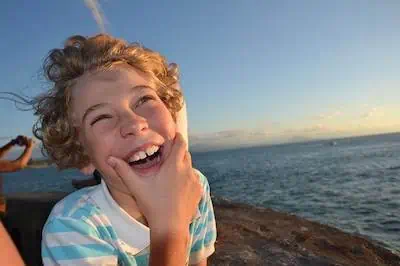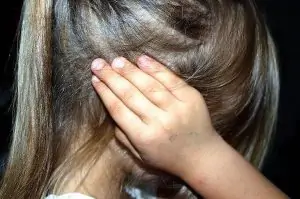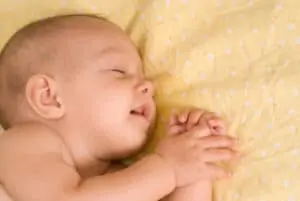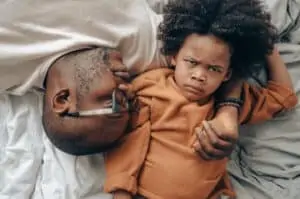The laughter of children is a beautiful thing. I love hearing my girls laughing and playing down the hall.
But things are far less hilarious when your child laughs when in trouble. If you have a toddler that thinks discipline is funny or a child that laughs when spanked, you are most certainly not amused.
In a recent message, someone told me, “My toddler laughs when I say no.” Believe it or not, while this seems irritating to have a child that cries and then laughs when being disciplined, there’s a logical reason for it.
And knowing the reason behind smiles, smirks, and laughter in the face of discipline can help restore your laughter at some point.
Why does my child laugh hysterically when I yell at him?
Let me ask you this…have you ever laughed in response to someone’s angry outburst? If so, think about why you did it. You weren’t mocking them, were you?
No, of course not. You were likely astonished by the yelling.

For some people, it’s quite common to laugh or have a silly response when feeling of nervousness or discomfort arise. This laughing from your child isn’t an intentional sign of disrespect.
So, if you suddenly yell at your child about something, they may be doing so because they’re uncomfortable or nervous about your reaction. It’s somewhere between the fight or flight, where your child really isn’t sure how to respond.
Why does my child smirk when in trouble?
Well, it’s a primitive response to smirk or smile when trouble comes your way. Though you might not realize it, check your expression the next time you sense trouble for yourself. You may just be smirking or even smiling yourself.
Smirking is our own natural way when we get on the defense and feel threatened. We also do this when trying to cover up our own aggressions.
When you try to discipline your child, and you see the smirking, hear laughing, or watch them avoid making eye contact with you, this is your cue that they feel uncomfortable.
Now, I know this is a hard pivoting point, but when you see it, try, just try, to change your reaction. Instead of screaming or going off the rails, try to take a few deep breaths and collect yourself so you can calmly discipline your child.
Easier said than done, absolutely.
But if you stop and think about how it’s not going to diffuse the situation and how changing your reaction will get the results you want, you’ll be more likely to hold back.
It’s easy to think our children are being defiant and problematic when being called out for behavior we find undesirable. The reason we need to take pause is that, quite simply, no one listens or processes important information when they are afraid, uncomfortable, or nervous.
In other words, it’s not fruitful, and you’ll need to change your approach to get the desired results.
Why does my toddler laugh when he hurts?
It’s largely the same reason they laugh when they are in trouble. Laughter helps chase away the bad feelings.
And now that you know all of this about why your child laughs when something is not amusing, like being disciplined or getting hurt, what can you do?
Well, you can compose yourself, get down on their level and acknowledge it. “I know you’re not laughing to be rude and that you are doing it because you are afraid. Calm down first, and then we will talk about it,” this is a great way to broach the subject.
This will also help you discipline them accordingly. And hopefully, it will open those lines of communication between you and your toddler. By changing that reaction with a few simple and calm words, we can show our children a better way to acknowledge feelings of uneasiness, nervousness, and fear.
Incidentally, if you haven’t done so at this point with your toddler, during a calm moment, make sure you sit down together and come up with appropriate rules and consequences. This can help your child understand what is and isn’t acceptable behavior and what the punishment will be for not following the rules you set.
Kids thrive on consistency and routine, and rules are merely part of that. Knowing what to expect will make them less likely to break the rules. And they’ll be less likely to laugh when you call them out on it.
Leslie Berry lives with her husband and two young daughters in Los Altos, California, where she loves helping other moms get comfortable with motherhood and embracing the insanity with facts peppered with laughs.
She loves eating too much sushi, exercising, and jamming out on her Fender. Read more about Leslie here.






